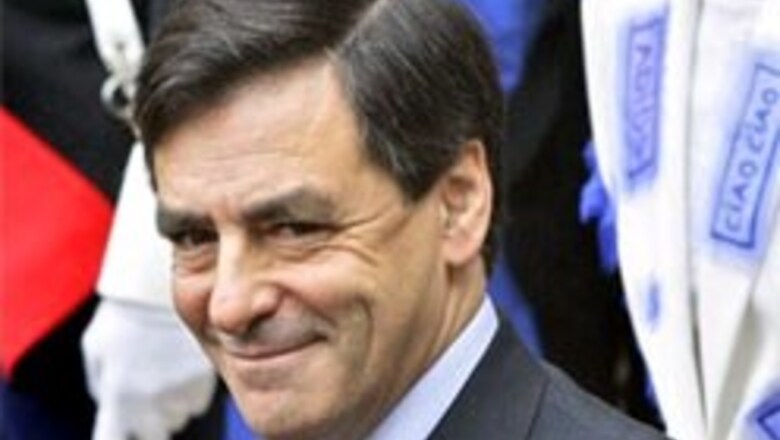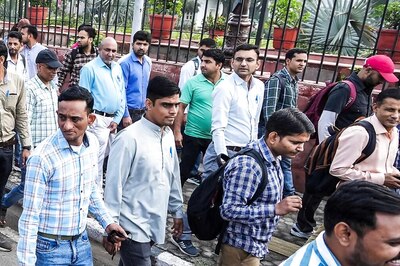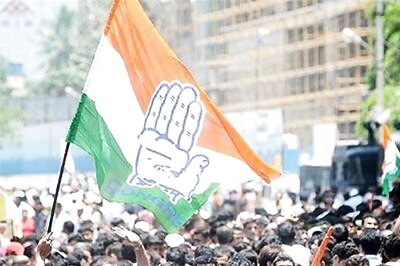
views
Paris: France's new reform-minded Prime Minister, Francois Fillon, started his job on Thursday by pledging to implement President Nicolas Sarkozy's sweeping program of change and then turning up at the Elysee Palace in shorts to go jogging with the new president.
Fillon has been appointed to head a revamped, slimmed-down government - expected to be named Friday - to include political rivals and nearly as many women as men. Well-known leftist personality Bernard Kouchner could be Sarkozy's new foreign minister.
During a brief ceremony in which outgoing Prime Minister Dominique de Villepin handed over power to Fillon, the new head of government said he would ''assure an eminent place'' for France and rally the nation in a ''spirit of outreach.''
Fillon, 53, an efficient four-time minister with a lower profile than the president, has been a confidant of Sarkozy. The two men met later on Thursday to go jogging, with Fillon arriving in shorts at the presidential Elysee Palace.
An hour after Fillon's appointment, Villepin, in office since June 2005, formally turned over power to the new prime minister at the ornate, 18th-century Hotel Matignon on the Left Bank that serves as the office of the prime minister.
Events moved quickly once Sarkozy took office Wednesday from Jacques Chirac, a fellow conservative ending 12 years as president. Fillon's appointment a day later was to be followed Friday with the naming of a new government, Sarkozy aides said.
Sarkozy has said suggested no time would be wasted moving forward with his promises of reform to rev up the sluggish French economy.
The streamlined government is to be made up of 15 members, around half of them women and at least one from the left to signal the willingness of Sarkozy, accused of divisiveness by rivals, to include figures from outside his political camp. Fillon has said it would be a ''tight and efficient team.''
Consultations were continuing on Thursday to put the team together, with aides of Sarkozy saying it would be made up of eight men and six women. The aides, not authorized to speak publicly, asked not to be named.
PAGE_BREAK
Kouchner, co-founder of the Doctors Without Borders medical charity, has been tapped for the post of foreign minister, but there has been no official word as to whether he has accepted the job.
Fillon, echoing Sarkozy, promised to defend the heritage and identity of France and keep the nation together while pushing through changes.
''In a world of 6 billion people, the 60 million French people must remain united,'' he said. ''I will respect all of the commitments we made.''
Villepin said the new prime minister ''has all the assets to succeed.''
Fillon has led several reforms, including tough changes to retirement benefits in 2003 and ending the monopoly of France Telecom. However, enemies remember students taking to the streets over his changes to the baccalaureate college examinations while education minister.
Fillon, a member of Sarkozy's governing Union for a Popular Movement party, has been Sarkozy's near constant companion in recent weeks and was widely considered a likely prime minister. He pushed pension reform as social affairs minister from 2002 to 2004 and was education minister from 2004 to 2005.
During the presidential campaign, Sarkozy called Fillon ''more than perfect.''
As prime minister, Fillon will be charged with applying Sarkozy's policy of ''rupture'' with the era of Chirac.
Sarkozy has vowed to end France's economic stagnation, lower social tensions and inspire new confidence among his compatriots.
He plans to put big reforms before parliament at an extraordinary session in July, including making overtime pay tax-free to encourage people to work more.
Another change would ensure tougher sentencing for repeat offenders, and a third would toughen criteria for immigrants trying to bring their families to France. He also wants to curb the ability of unions to cripple France with strikes and make it easier for companies to hire and fire workers.
The ease with which these reforms will be enacted depends in large measure on the outcome of June legislative elections and the strength of Sarkozy's parliamentary majority.



















Comments
0 comment